by Heather Plett | Mar 27, 2014 | Uncategorized
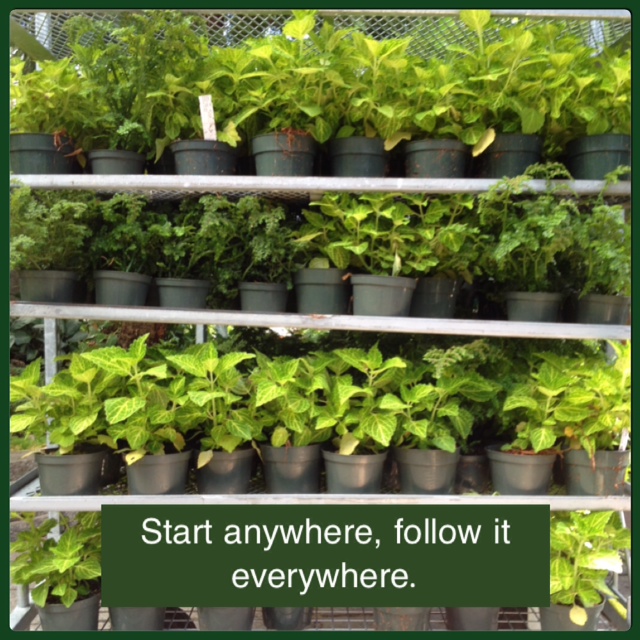 Yesterday I got an email from a woman asking me if I ever offered scholarships for my programs. She’d visited the Lead with Your Wild Heart page and said “When I clicked on your course I felt immediately that this is exactly what I need to do.” The cost was a challenge for her, though, so she took a chance and asked.
Yesterday I got an email from a woman asking me if I ever offered scholarships for my programs. She’d visited the Lead with Your Wild Heart page and said “When I clicked on your course I felt immediately that this is exactly what I need to do.” The cost was a challenge for her, though, so she took a chance and asked.
As soon as I saw her email, I knew I wanted to help her get what she needed. “Tell me what you can pay,” I said, “and it’s yours. You can pay more in the future if it feels possible, or you can pay it forward in some way.”
She sent me a beautiful note of appreciation and a little more of her story and… suddenly something shifted in me. I felt the Spirit-nudge. “I need to do this for more women,” I thought. “I want to be a citizen of a world where more women step into their courage and leadership potential, and so I need to support them in getting there.”
Within about half an hour (that’s how quickly I can work when I trust the Spirit’s nudge) I’d changed the sales page for Lead with Your Wild Heart to “pay what you can” and sent an email to my list to let them know of the change. Within minutes, sales started coming in and almost all of them included a note with a variation of “This is EXACTLY the right thing at EXACTLY the right time. I feel like you are up in my head and know what I need even before I do!”
Did I make a lot of money? No. Did I follow Spirit’s leading and nurture leadership and courage in women? YES! That’s good enough for me.
Then this morning something else happened. I hosted the first call for the brand new (free) Idea Incubator. Twenty-seven people came together to seed their tender ideas in the incubator, offer compost and soil for each others ideas, and marvel at the possibility of the global garden we can grow together. We started with a group circle where everyone introduced themselves and shared a brief check-in about where we’re feeling the trembling in our lives, and then we broke into small groups of 4 or 5 to help each other grow these ideas. It was a tender beginning, with a few technological challenges, but it was full of energy and potential. None of us quite know what we’re doing in this new space, but – in the words of Meg Wheatley – we’ve agreed to “start anywhere and follow it everywhere.”
After the call, I had to close my computer and leave the house. I felt a physical trembling all over my body, fueled partly from the stress of hosting something brand new on technology I’m not very familiar with, but mostly from the excitement and energy that was shared by these beautiful people spread across North America and reaching across the ocean to Europe. I took my journal to the green space at the Conservatory to process what had just happened. The workers at the conservatory were planting fresh plants and I knew I’d come to the right place for my personal de-briefing (hence the photo above).
Am I making any money from the Idea Incubator? No. Did I follow Spirit’s leading and create an environment where people feel nurtured and supported and where beautiful ideas can grow ? YES!
That’s good enough for me!
I am simply being faithful to the call and trusting that the rest will follow. The outcome is not my responsibility. The commitment is.
p.s. You can join Idea Incubator any time you want. And you can buy Lead with Your Wild Heart with whatever you feel you can pay.
by Heather Plett | Mar 21, 2014 | Uncategorized
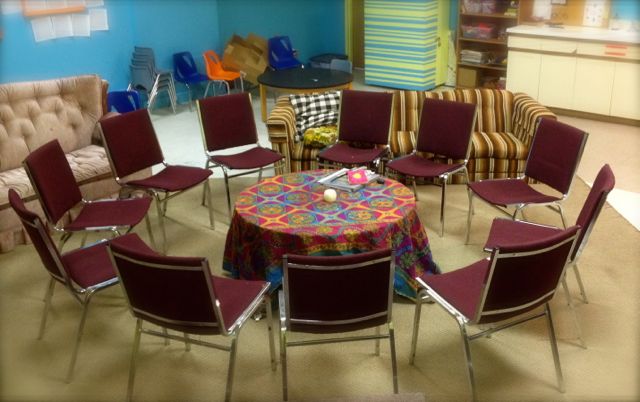 “We must come together in ways that respect the solitude of the soul, that avoid the unconscious violence we do when we try to save each other, that evoke our capacity to hold another life without dishonoring its mystery, never trying to coerce the other into meeting our own needs.” ― Parker J. Palmer, Let Your Life Speak
“We must come together in ways that respect the solitude of the soul, that avoid the unconscious violence we do when we try to save each other, that evoke our capacity to hold another life without dishonoring its mystery, never trying to coerce the other into meeting our own needs.” ― Parker J. Palmer, Let Your Life Speak
All around us, there is a hunger for belonging, a hunger for community, a hunger to be held in circles of grace where we can open our hearts and know that we will be treated tenderly and respectfully. Some of us have not yet awakened to that hunger, believing instead that we can go through life as independent, self-reliant souls. It’s there, though, hidden under the armour we’ve built up in our efforts to avoid being wounded.
To feed this hunger in the world, we need to create more places where people are fed. These are the places I call Circles of Grace.
A Circle of Grace is a place where people gather for meaningful conversation, for compassion, for support, for encouragement, and for growth. While in the circle, we do our best to extend grace to everyone there, including ourselves. We speak with openness and listen with intention. We make a commitment within the circle to be as authentic as we know how to be, and we welcome the same from others. We share, laugh, cry, grow, stretch, and tremble. Even when we disagree and conflict arises, we respond with compassion and open hearts and minds.
A Circle of Grace can be hosted as part of a retreat, it can be the frame for a weekly class (as I do with Creative Writing for Self-Discovery), it can be a way for your family to work through some difficult issues, it can be the way a community or church gathers regularly, and it can even be used in virtual gatherings (as I do with Openhearted Writing Circle).
How do you host a Circle of Grace? Here are some tips.
1. Create enough structure to hold the container, but enough flexibility to adapt to what wants to emerge. The best structure I know of can be found in PeerSpirit’s Circle Guidelines (which you can download for free). Sometimes it feels a little strange to bring structure into something that seems organic, but the structure helps you hold whatever is going on in the circle and helps you take conversation to a deeper place without falling into chaos. You can adapt the structure to what needs to happen in the space. For example, I always use a talking piece at the beginning of a gathering for check-in and at the end for check-out, so that each person has an opportunity to speak without interruption, and then I set it aside in between for less structured conversation.
2. Set guidelines and intentions so that everyone has a sense of their commitment while in circle. Guidelines help us feel more secure in the container because we know how to behave with each other and know what to expect from others. This is a sample of the guidelines and intentions I use when I host Openhearted Writing Circles:
- This is a circle of grace. It is a safe space for all of us, and to make it so, we will treat each other with kindness and grace.
- This is a confidential circle. Nothing that is shared here will leave the circle without the permission of the person speaking.
- This is a sharing circle. Each of us will be invited and encouraged to share questions, wisdom, writing, etc. Nobody will be pushed to share if they don’t feel ready, but everyone will be invited.
- This is a learning circle. We are all here to learn, and so no questions will be considered foolish and no wisdom shared will be silenced. We are all learners together, including the teacher.
- This circle belongs to each of us. Each of us is individually and collectively responsible for how we interact, what we share, and what we get out of this time together.
3. Keep an open mind and suspend judgement. It is important that everyone in the circle feels safe and accepted. This doesn’t mean that any kind of behaviour is acceptable (the guidelines and intentions help with that), but it means that people can share their stories, hurts, and wounds without fearing that they are being judged. Sometimes that will be hard to do (e.g. when someone shares an opinion or worldview that is very different from your own and you’re pretty sure they’re wrong) but it is crucial to extending grace in a meaningful way.
4. Don’t try to fix anyone. As Parker Palmer mentions in the above quote, we need to “avoid the unconscious violence we do when we try to save each other”. When others share the struggles they are dealing with, it is human nature to want to help them resolve those struggles, but more often than not, they are sharing in order to feel heard rather than to be fixed. According to Brene Brown in Daring Greatly, these efforts to fix each other are our defenses against vulnerability. We are afraid to see too much vulnerability in each other and in ourselves, and so we try to rush past the brokenness to a place where we feel more comfortable and struggles are resolved. In a Circle of Grace, we welcome vulnerability and we offer support without trying to fix.
5. Encourage people to ask for what they need. While we don’t rush in to fix things for people, we are happy – as hosts and co-creators of the circle – to respond to their requests if they ask for hugs, advice, encouragement, or silence. Create a space where people learn to be comfortable asking for what they need. This will probably take time (most of us have been taught to stifle our needs and not to extend trust to each other too quickly), but it’s worth the investment.
This is part of a document I am creating for people who wish to use Pathfinder in women’s circles and classrooms. It will be available as a free downloadable pdf. To be notified of its release, sign up for my newsletter (on the top right of this page).
If you wish to learn more about hosting circles, I encourage you to read The Circle Way by Christina Baldwin and Ann Linnea of PeerSpirit, or A Hidden Wholeness by Parker Palmer.
by Heather Plett | Mar 17, 2014 | Uncategorized
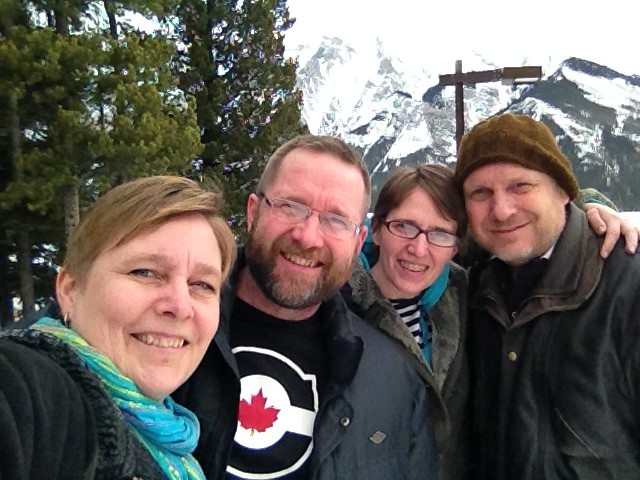
Because these are the only three people on the planet who:
Know the sound of our dad’s voice singing “his eye is on the sparrow” from across the farmyard,
Shoveled manure from a pigpen with me,
Knew the combination of rings we had to answer on the party line,
Crawled through attics looking for kittens with me,
Built bale forts and mazes with me and then pulled the bales apart when I panicked and couldn’t find my way out,
Have tasted the sweetness of the berries along Raspberry Lane,
Remember that feeling of nervous responsibility while holding the flashlight and/or ladder while Dad climbed down into the well,
Know the sound of our mother’s voice when she’d sing “Good morning Merry Sunshine, how did you get up there?”
Remember a dog named Curly and a horse named Prince,
Know what it’s like to be woken in the middle of the night to drag waterlogged cows out of flooded pastures,
Remember exactly what Dad’s aftershave smelled like once he was clean and ready for church,
Enjoyed a good chuckle when Mom accidentally brought a marijuana t-shirt home from Holland,
Know the precise way Dad liked his eggs, fried in the cast iron frying pan with crispy edges and a yoke that “would run down your chin”,
Remember the taste of Mom’s freshly baked buns with “Gramma jam”,
And know the ache of grief from losing Dad to a tractor accident and Mom to cancer;
We drove hundreds of miles across the prairies for a short visit to the mountains because one of us has been beaten up by cancer (and other worries) and needed some companionship.
by Heather Plett | Mar 12, 2014 | Uncategorized
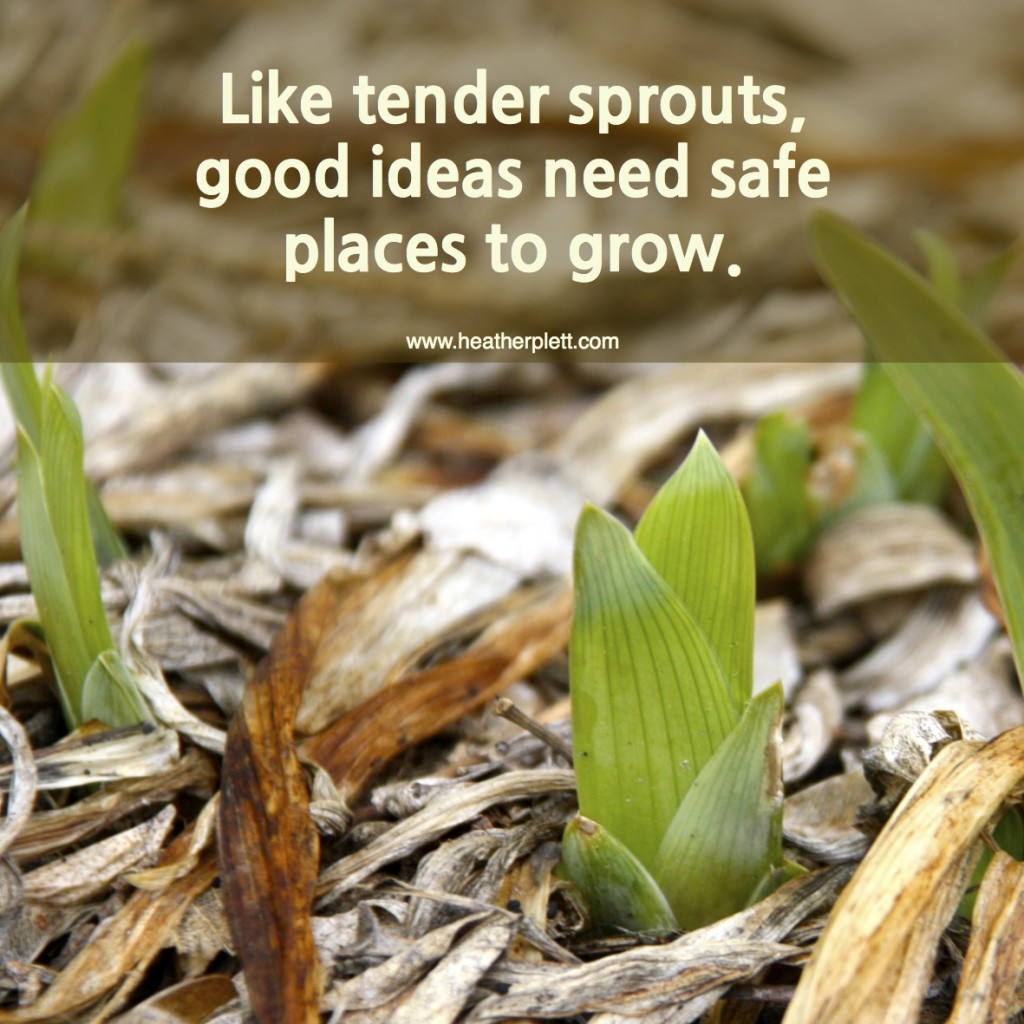 “Beliefs that deviate substantially from the general social consensus are especially hard to maintain, requiring usually some kind of sanctuary… in which the deviant belief receives constant affirmation… They provide a kind of incubator for the fragile, nascent beliefs of the new story to develop. There they can grow a bed of roots to sustain them from the onslaughts of the inclement climate of belief outside.” – Charles Eisenstein, The More Beautiful World Our Hearts Know is Possible
“Beliefs that deviate substantially from the general social consensus are especially hard to maintain, requiring usually some kind of sanctuary… in which the deviant belief receives constant affirmation… They provide a kind of incubator for the fragile, nascent beliefs of the new story to develop. There they can grow a bed of roots to sustain them from the onslaughts of the inclement climate of belief outside.” – Charles Eisenstein, The More Beautiful World Our Hearts Know is Possible
All around me, I see people who want to step out of old stories and into something new, but they don’t know where to start and they’re not connected to enough people who believe in this new vision that’s emerging for them. These people are dreaming of a better world, but they face loneliness, isolation, and sometimes even ridicule for daring to voice something that’s outside of the accepted norm.
Some of these people have opted out of the financial economy and choose to live instead in the gift economy. Some of them have moved away from traditional agriculture and are experimenting with more sustainable earth practices. Some have left corporate jobs to teach art-making to troubled teens, poetry to prisoners, or yoga to executives. Some are stepping out of the rat race to live a more intentional and mindful life.
These creative and hopeful people are making music in the town square, planting trees in empty lots, building labyrinths out of garbage, turning ramshackle old buildings into community centres, wrapping yarn around trees and park benches, turning parking lots into parks, making bags out of old clothes, ignoring church policy to bring marginalized people through their doors, gathering people into conversation circles, growing vegetables in barrels, teaching elders to dance, and finding one hundred and one other ways to break from the norm.
All around the world, dreamers are waking up and breathing love and life into their dreams.
Are you one of those people? Or are you still in the dreaming stage and you haven’t yet found the kind of incubator Charles Eisenstein is talking about where your new belief system can grow and flourish?
If you are one of those daring dreamers, let me say first of all that I love and support you. There are no people I’d rather spend my time with than daring dreamers, radical revolutionaries, and openhearted lovers. I want to gather you all into a big circle, look deeply into your eyes, and let you know that you are seen. I SEE YOU. And I love you.
I want to create a space for your dreams to begin to grow. I want to see those tender little seeds find a safe place to dig their roots into the soil and reach their tender sprouts toward the sun.
For this purpose, I’m creating an Idea Incubator, and I welcome you to join me.
What will the Idea Incubator look like?
1. Once a month we’ll have an Idea Incubator call where you can share your ideas and get advice, feedback, and (most importantly) moral support. The format for the call will depend on the number of people who attend. If there is a small number (under 8), we’ll stay in one circle and all participate in the same conversation. If there are more than 8, we’ll break into smaller, self-facilitated groups where ideas can be shared.
2. We’ll also have a private Facebook group that will support the monthly calls and give you a secondary space where you can share your ideas and ask for advice, feedback, and support. This may also be a place where you can build networks and find partners and allies for your work.
Who should participate in the Idea Incubator?
You should participate if you:
- Have an idea (or two or three) that needs an incubator to help it grow.
- Want to support other people’s ideas.
- Believe that the world needs people who will help us find a path into a new “Story of Interbeing” (Charles Eisenstein’s term).
- Have become disillusioned with the systems (industrial, financial, health care, education, government, etc.) that are not serving people as well as they should.
- Are willing to contribute to meaningful conversations in a positive, optimistic, and supportive way.
- Believe that we are all responsible for our world and that each of us can make a positive contribution.
What kind of ideas are welcome?
Any ideas that hold the intention of making a positive contribution to the world, your community, your family, and/or to yourself are welcome. These ideas might look like:
- new art/yoga/dance/music/personal development courses/retreats/workshops/conferences you want to create
- new community projects you want to initiate
- a new business you want to grow, or an old business you want to change
- a conversation you want to host in your community/church/government/youth group/etc.
- a youth initiative you feel your community would benefit from
What’s not welcome?
I hesitate to answer this question, because I want all to feel welcome. However, I feel the need to be clear that this is not a place to promote your business, sell products or services, pour cold water on other people’s ideas, be a doomsday prophet about the state of the world, or proselytize about your belief system. We want positive, engaged, generous people in the circle.
What are our guiding principles?
- This is a circle of trust and grace. It is a safe and supportive space for all of us, and to make it so, we will treat each other with kindness and generosity.
- This is a confidential circle. Nothing that is shared here will leave the circle without the permission of the person speaking.
- This is a sharing circle. Each of us will be invited and encouraged to share ideas, questions, wisdom, resources, etc.
- This is a learning and growth circle. We are all here to learn, and so no questions will be considered foolish and no wisdom shared will be silenced. We are all learners together on a path to a more beautiful world.
- This circle belongs to each of us. Each of us is individually and collectively responsible for how we interact, what we share, and what we get out of this time together.
How will the Idea Incubator calls be facilitated?
This work is will be guided by elements of the following practices:
1. The Circle Way that Christina Baldwin and Ann Linnea of PeerSpirit teach (read more about it in The Circle Way: A Leader in Every Chair)
2. The Circle of Trust approach that Parker Palmer teaches (read more about it in A Hidden Wholeness).
3. The Pro-Action Cafe that is one of the practices of The Art of Hosting and Harvesting Conversations that Matter.
We will start with a collective circle, setting our intentions and doing a short check-in to see who’s on the call. If the numbers warrant, we will then break into smaller groups and each person who has brought an idea to the circle will have a chance to share the idea and get feedback and support. If enough time is available, we may do a second round of small group conversations so that you can get feedback from another small group. We will end back in the larger group. (Note: As this is still in the development phase and the idea has not been fully tested, the format may change once we’ve tried it once or twice.)
How much does it cost?
There is no financial contribution required. The only contribution will be your time, ideas, and supportive feedback to other people’s ideas.
How can I join?
If you are interested in being part of this initiative, fill out the form below. You will then be added to the private Facebook group and you will receive emails notifying you of when the calls will be held and how to join them. Adding your name does not mean that you are obligated to be on the calls, but we do hope that you will choose to contribute when you can.
Questions? Contact me.
by Heather Plett | Mar 5, 2014 | Uncategorized
At least once a year for the last dozen years, I have gone away for a personal retreat for a day or two or three. It’s a practice that has become crucial to my self-care. Sometimes I go when I need clarity on a new project or new direction in my life, sometimes I go when I’m deep in grief, sometimes I go to mark an important milestone, and sometimes I go just to be nourished.
It’s very simple, really – find an inexpensive place to go (for $70, I get a private room and three meals at the local monastery, or you could ask a friend who’s out of town if you can house-sit for her), bring the things that matter to you, tell your family it’s important, and go. When you get there, disconnect from all social media and don’t turn on the TV.
Here’s a short photo essay to help you imagine your own personal retreat.
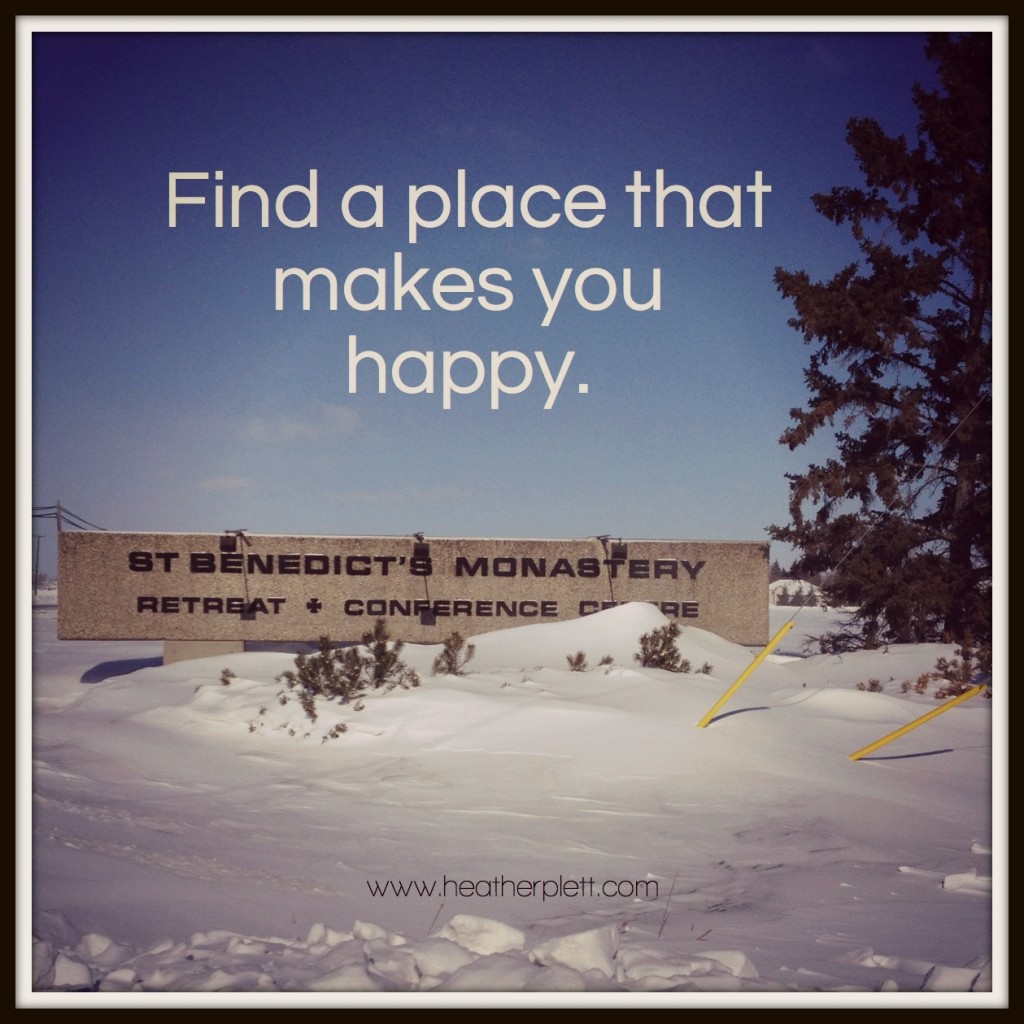


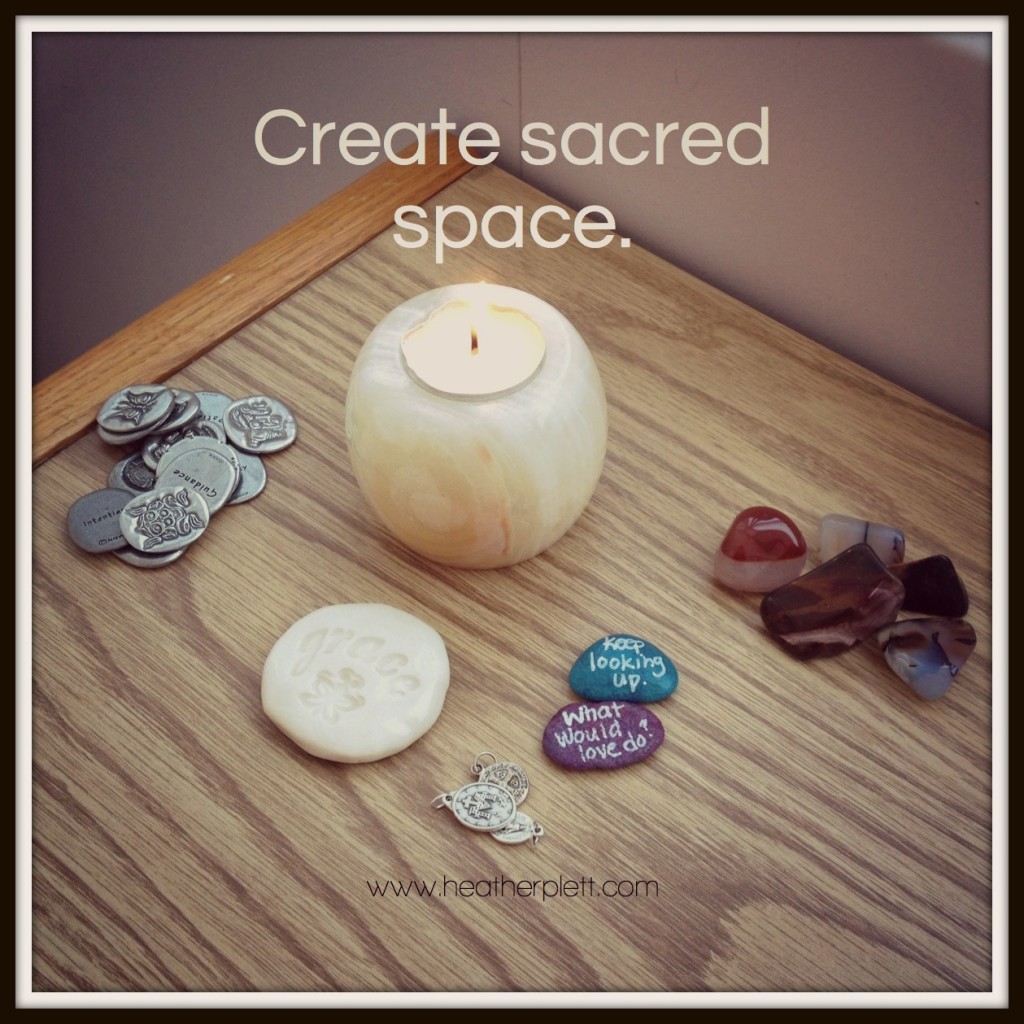
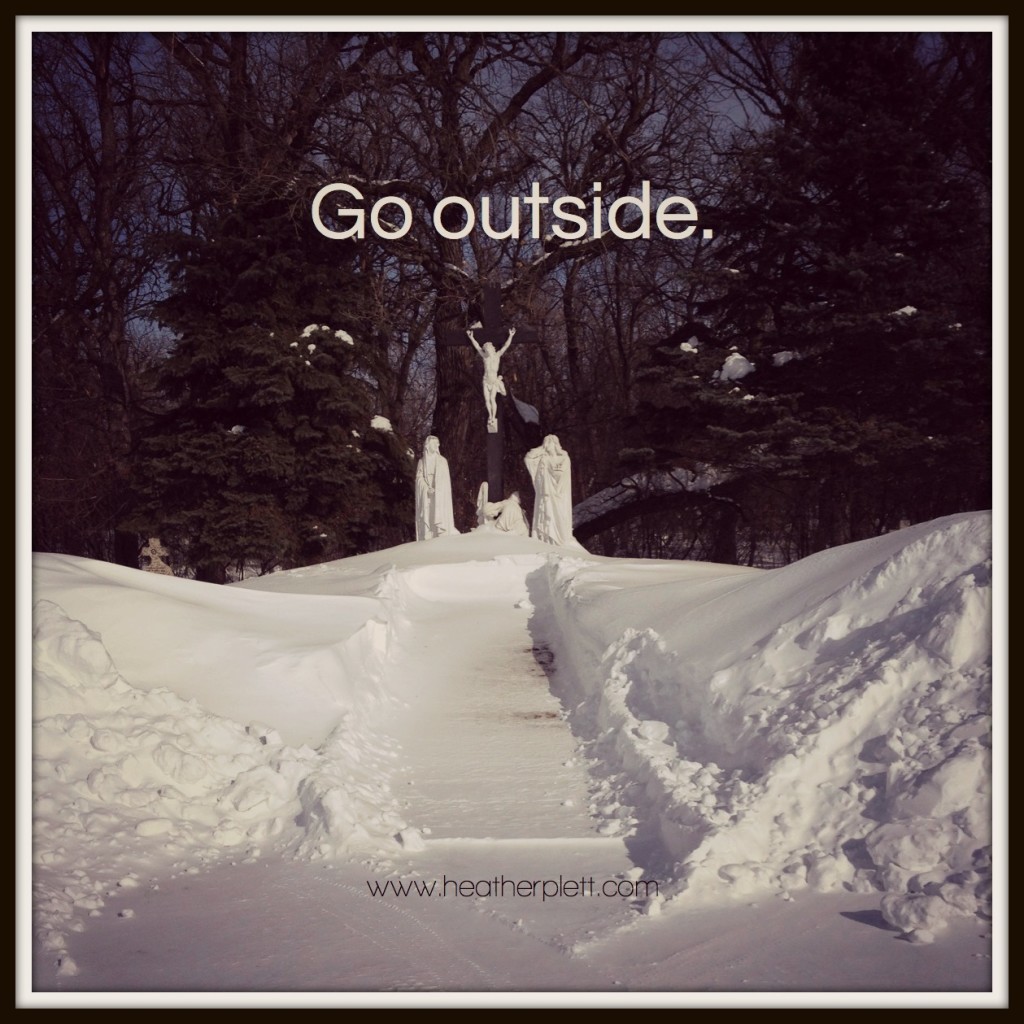
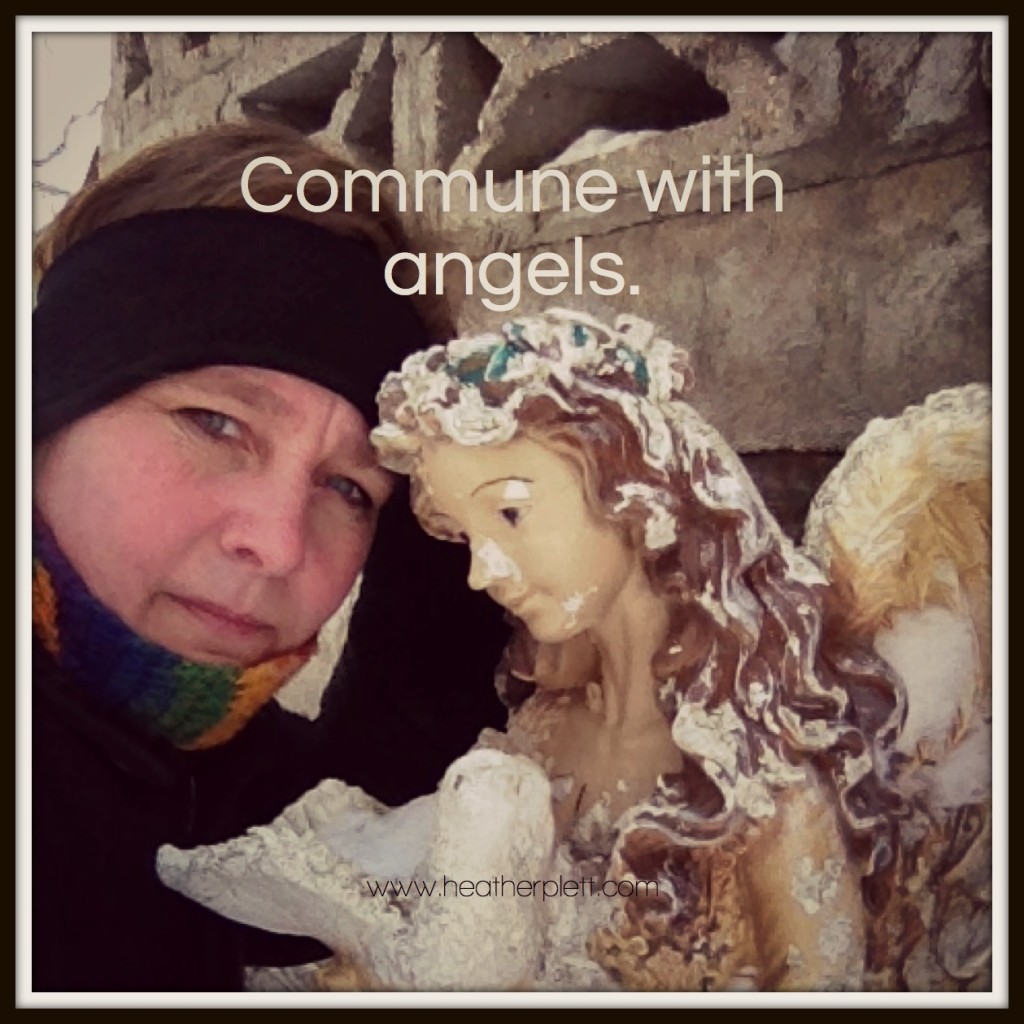
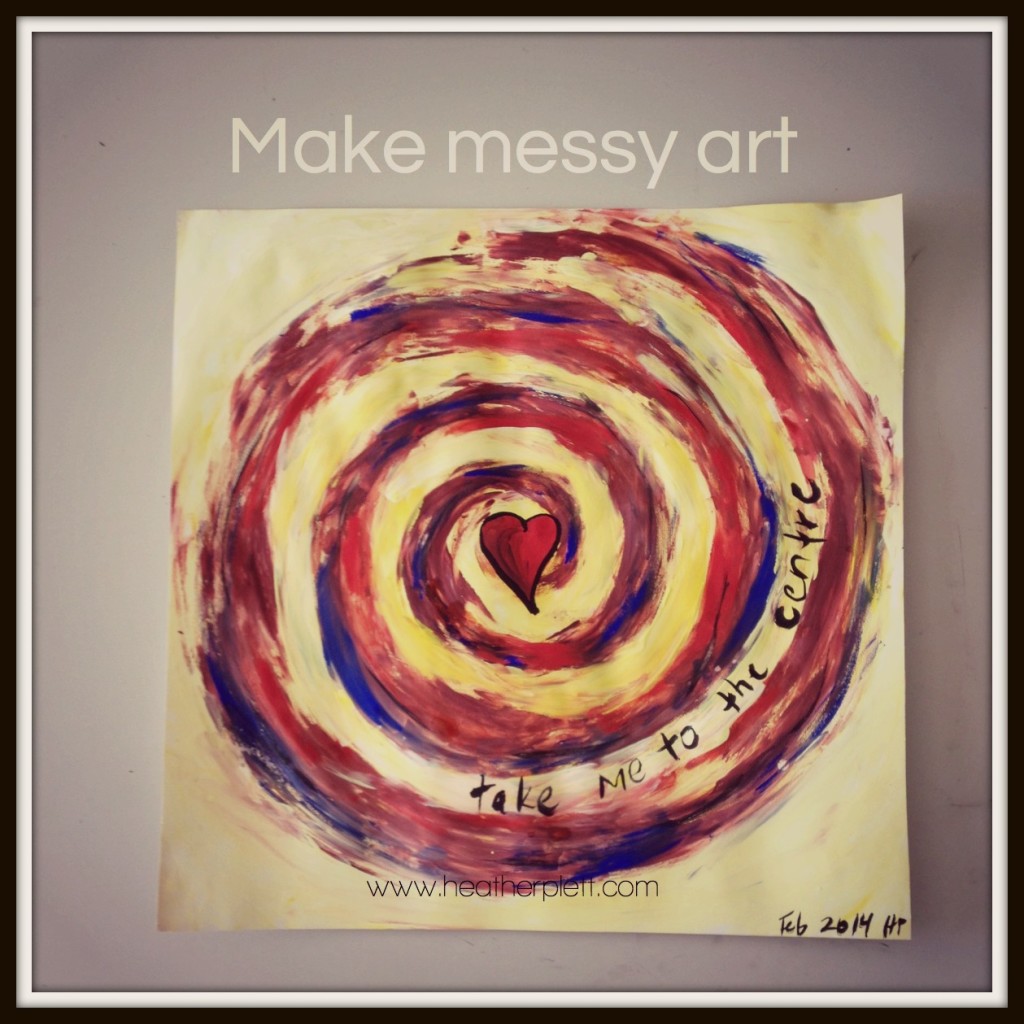

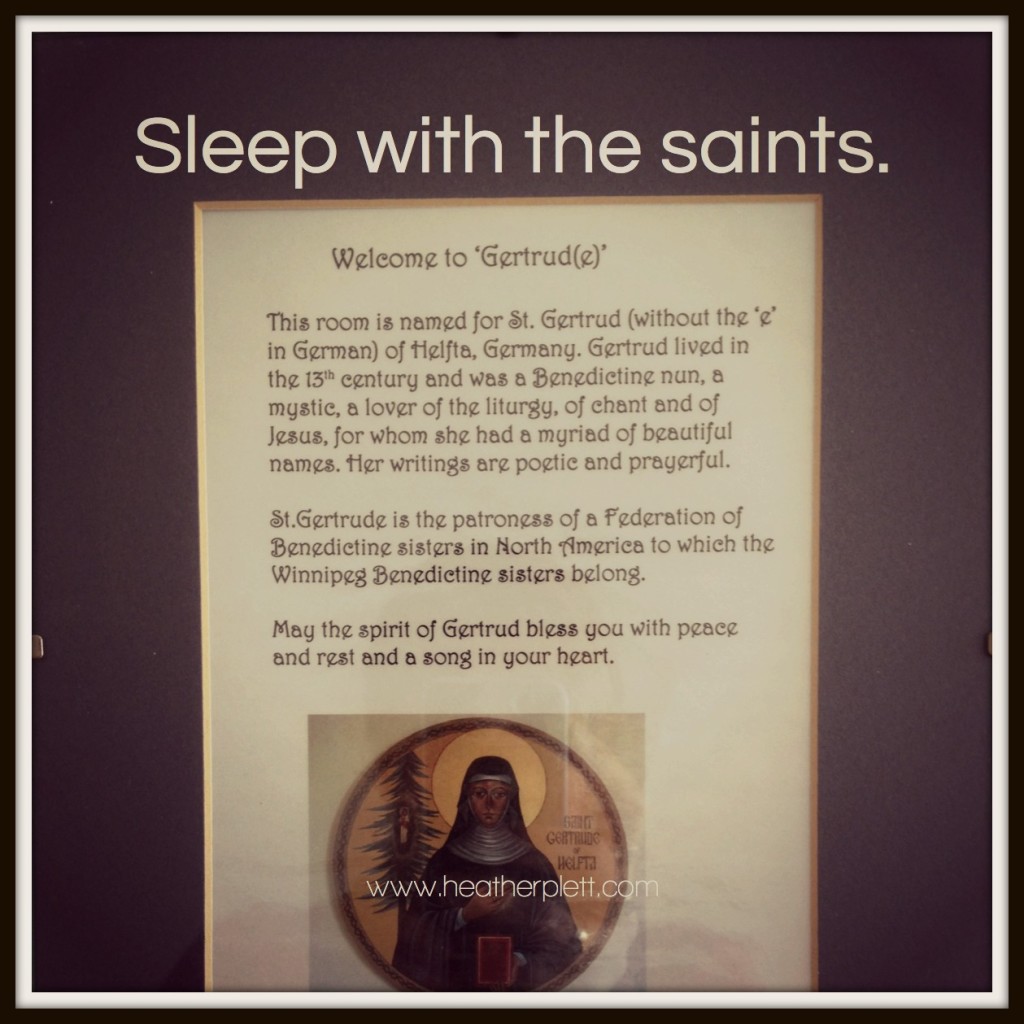
 Yesterday I got an email from a woman asking me if I ever offered scholarships for my programs. She’d visited the Lead with Your Wild Heart page and said “When I clicked on your course I felt immediately that this is exactly what I need to do.” The cost was a challenge for her, though, so she took a chance and asked.
Yesterday I got an email from a woman asking me if I ever offered scholarships for my programs. She’d visited the Lead with Your Wild Heart page and said “When I clicked on your course I felt immediately that this is exactly what I need to do.” The cost was a challenge for her, though, so she took a chance and asked.











